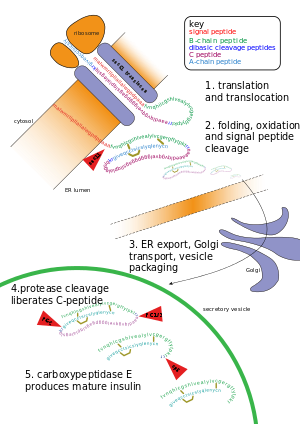翻译后修饰
外观
(重定向自翻譯後修飾)

翻译后修饰(英语:Post-translational modification,缩写PTM;又称后翻译修饰)是指蛋白质在翻译后的化学修饰。对于大部分的蛋白质来说,这是蛋白质生物合成的较后步骤。PTM是细胞信号传导中的重要组成部分。
蛋白质,或是多肽,是多条或一条氨基酸的链。当合成蛋白质时,20种不同的氨基酸会合并成为蛋白质。氨基酸的转译后修饰会附在蛋白质其他的生物化学官能团(如醋酸盐、磷酸盐、不同的脂类及碳水化合物)、改变氨基酸的化学性质,或是造成结构的改变(如建立双硫键),来扩阔蛋白质的功能。
再者,酶可以从蛋白质的N末端移除氨基酸,或从中间将肽链剪开。举例来说,胰岛素是肽的激素,它会在建立双硫键后被剪开两次,并在链的中间移走多肽前体,而形成的蛋白质包含了两条以双硫键连接的多肽链。
其他修饰,就像磷酸化,是控制蛋白质活动机制的一部分。蛋白质活动可以是令酶活性化或钝化。
加入官能团
[编辑]翻译后修饰包括以下加入官能团的反应:
- 乙酰化——通常于蛋白质的N末端加入乙酰。
- 烷基化——加入如甲基或乙基等烷基。
- 生物素化——用生物素附加物令保存的赖氨酸酰化。
- 谷氨酸化——在谷氨酸与导管素及其他蛋白质之间建立共价键。
- 甘氨酸化——在一个至超过40种甘氨酸与导管素的C末端建立共价键。
- 糖化——将糖基加入天冬酰胺、羟离氨酸、丝氨酸或苏氨酸,形成糖蛋白。
- 异戊二烯化——加入如法呢醇及四异戊二烯等异戊二烯。
- 硫辛酸化——附着硫辛酸的功能性。
- 磷酸泛酰巯基乙氨基化——像在脂肪酸、聚酮、非核糖组肽链及亮氨酸的生物合成中,从乙酰辅酶A加入4'磷酸泛酰巯基乙氨基。
- 磷酸化——加入磷酸根至丝氨酸、酪氨酸、苏氨酸或组氨酸。
- 硫酸化——将硫酸根加入至酪氨酸。
- 硒化
- C末端酰胺化
加入其他蛋白质或肽
[编辑]改变氨基酸的化学性质
[编辑]结构改变
[编辑]数据库与工具
[编辑]
蛋白质序列包含通过修饰酶识别的序列基序,并且可以在 PTM 数据库中记录或预测。 随着发现大量不同的修改,需要在数据库中记录此类信息。 PTM 信息可以通过实验手段收集,也可以从高质量、手动整理的数据中预测。 已经创建了许多数据库,通常侧重于某些分类群(例如人类蛋白质)或其他特征。
资源列表
[编辑]- PhosphoSitePlus (页面存档备份,存于互联网档案馆)[4] – 用于研究哺乳动物蛋白质翻译后修饰的综合信息和工具数据库
- ProteomeScout[5] – 实验性蛋白质和翻译后修饰数据库
- Human Protein Reference Database[5] – 用于不同修饰和了解不同蛋白质、它们的类别以及与致病蛋白质相关的功能/过程的数据库
- PROSITE[6] – 包括网站在内的多种类型 PTM 的共识模式数据库
工具
[编辑]蛋白质及其 PTM 可视化软件列表
案例
[编辑]参考文献
[编辑]- ^ Malakhova, Oxana A.; Yan, Ming; Malakhov, Michael P.; Yuan, Youzhong; Ritchie, Kenneth J.; Kim, Keun Il; Peterson, Luke F.; Shuai, Ke; and Dong-Er Zhang. Protein ISGylation modulates the JAK-STAT signaling pathway. Genes & Development. 2003, 17 (4): 455–460 [2006-11-22]. (原始内容存档于2008-07-19).
- ^ Van G. Wilson , 编. Sumoylation: Molecular Biology and Biochemistry. Horizon Bioscience. 2004. ISBN 978-0-9545232-8-2. (原始内容存档于2005-02-09).
- ^ Lee TY, Huang HD, Hung JH, Huang HY, Yang YS, Wang TH. dbPTM: an information repository of protein post-translational modification. Nucleic Acids Research. January 2006, 34 (Database issue): D622–7. PMC 1347446
 . PMID 16381945. doi:10.1093/nar/gkj083.
. PMID 16381945. doi:10.1093/nar/gkj083.
- ^ Hornbeck PV, Zhang B, Murray B, Kornhauser JM, Latham V, Skrzypek E. PhosphoSitePlus, 2014: mutations, PTMs and recalibrations. Nucleic Acids Research. January 2015, 43 (Database issue): D512–20. PMC 4383998
 . PMID 25514926. doi:10.1093/nar/gku1267.
. PMID 25514926. doi:10.1093/nar/gku1267.
- ^ 5.0 5.1 Goel R, Harsha HC, Pandey A, Prasad TS. Human Protein Reference Database and Human Proteinpedia as resources for phosphoproteome analysis. Molecular BioSystems. February 2012, 8 (2): 453–63. PMC 3804167
 . PMID 22159132. doi:10.1039/c1mb05340j.
. PMID 22159132. doi:10.1039/c1mb05340j.
- ^ Sigrist CJ, Cerutti L, de Castro E, Langendijk-Genevaux PS, Bulliard V, Bairoch A, Hulo N. PROSITE, a protein domain database for functional characterization and annotation. Nucleic Acids Research. January 2010, 38 (Database issue): D161–6. PMC 2808866
 . PMID 19858104. doi:10.1093/nar/gkp885.
. PMID 19858104. doi:10.1093/nar/gkp885.
- ^ Warnecke A, Sandalova T, Achour A, Harris RA. PyTMs: a useful PyMOL plugin for modeling common post-translational modifications. BMC Bioinformatics. November 2014, 15 (1): 370. PMC 4256751
 . PMID 25431162. doi:10.1186/s12859-014-0370-6.
. PMID 25431162. doi:10.1186/s12859-014-0370-6.
- ^ Yang Y, Peng X, Ying P, Tian J, Li J, Ke J, Zhu Y, Gong Y, Zou D, Yang N, Wang X, Mei S, Zhong R, Gong J, Chang J, Miao X. AWESOME: a database of SNPs that affect protein post-translational modifications. Nucleic Acids Research. January 2019, 47 (D1): D874–D880. PMC 6324025
 . PMID 30215764. doi:10.1093/nar/gky821.
. PMID 30215764. doi:10.1093/nar/gky821.
- ^ Morris JH, Huang CC, Babbitt PC, Ferrin TE. structureViz: linking Cytoscape and UCSF Chimera. Bioinformatics. September 2007, 23 (17): 2345–7. PMID 17623706. doi:10.1093/bioinformatics/btm329
 .
.
- ^ 1tp8 - Proteopedia, life in 3D. www.proteopedia.org. [2023-04-18]. (原始内容存档于2009-08-28).
外部连接
[编辑]- dbPTM - database of protein post-translational modifications (页面存档备份,存于互联网档案馆)
- List of posttranslational modifications in ExPASy (页面存档备份,存于互联网档案馆)
- Browse SCOP domains by PTM (页面存档备份,存于互联网档案馆) — from the dcGO database
- Statistics of each post-translational modification from the Swiss-Prot database
- AutoMotif Server - A Computational Protocol for Identification of Post-Translational Modifications in Protein Sequences
- Functional analyses for site-specific phosphorylation of a target protein in cells
- Detection of Post-Translational Modifications after high-accuracy MSMS
- Overview and descripition of commonly used post-translational modification detection techniques (页面存档备份,存于互联网档案馆)
